The AMD 3rd Gen Ryzen Deep Dive Review: 3700X and 3900X Raising The Bar
by Andrei Frumusanu & Gavin Bonshor on July 7, 2019 9:00 AM EST** = Old results marked were performed with the original BIOS & boost behaviour as published on 7/7.
Benchmarking Performance: Web Tests
While more the focus of low-end and small form factor systems, web-based benchmarks are notoriously difficult to standardize. Modern web browsers are frequently updated, with no recourse to disable those updates, and as such there is difficulty in keeping a common platform. The fast paced nature of browser development means that version numbers (and performance) can change from week to week. Despite this, web tests are often a good measure of user experience: a lot of what most office work is today revolves around web applications, particularly email and office apps, but also interfaces and development environments. Our web tests include some of the industry standard tests, as well as a few popular but older tests.
We have also included our legacy benchmarks in this section, representing a stack of older code for popular benchmarks.
All of our benchmark results can also be found in our benchmark engine, Bench.
WebXPRT 3: Modern Real-World Web Tasks, including AI
The company behind the XPRT test suites, Principled Technologies, has recently released the latest web-test, and rather than attach a year to the name have just called it ‘3’. This latest test (as we started the suite) has built upon and developed the ethos of previous tests: user interaction, office compute, graph generation, list sorting, HTML5, image manipulation, and even goes as far as some AI testing.
For our benchmark, we run the standard test which goes through the benchmark list seven times and provides a final result. We run this standard test four times, and take an average.
Users can access the WebXPRT test at http://principledtechnologies.com/benchmarkxprt/webxprt/
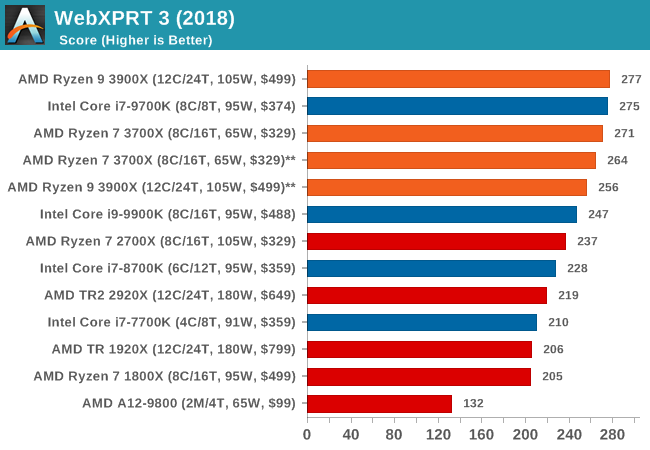
WebXPRT 2015: HTML5 and Javascript Web UX Testing
The older version of WebXPRT is the 2015 edition, which focuses on a slightly different set of web technologies and frameworks that are in use today. This is still a relevant test, especially for users interacting with not-the-latest web applications in the market, of which there are a lot. Web framework development is often very quick but with high turnover, meaning that frameworks are quickly developed, built-upon, used, and then developers move on to the next, and adjusting an application to a new framework is a difficult arduous task, especially with rapid development cycles. This leaves a lot of applications as ‘fixed-in-time’, and relevant to user experience for many years.
Similar to WebXPRT3, the main benchmark is a sectional run repeated seven times, with a final score. We repeat the whole thing four times, and average those final scores.
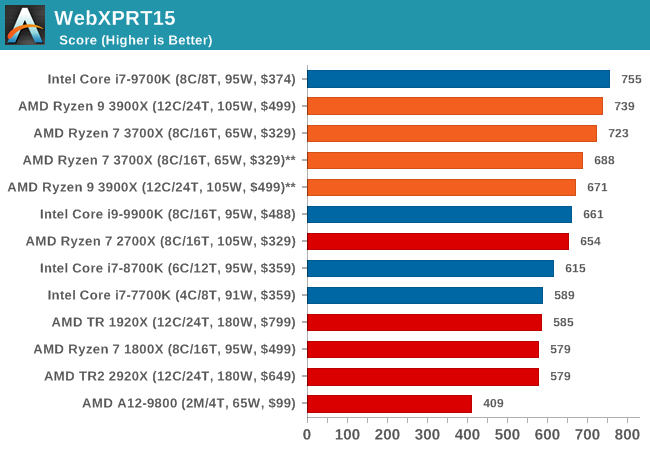
Speedometer 2: JavaScript Frameworks
Our newest web test is Speedometer 2, which is a accrued test over a series of javascript frameworks to do three simple things: built a list, enable each item in the list, and remove the list. All the frameworks implement the same visual cues, but obviously apply them from different coding angles.
Our test goes through the list of frameworks, and produces a final score indicative of ‘rpm’, one of the benchmarks internal metrics. We report this final score.
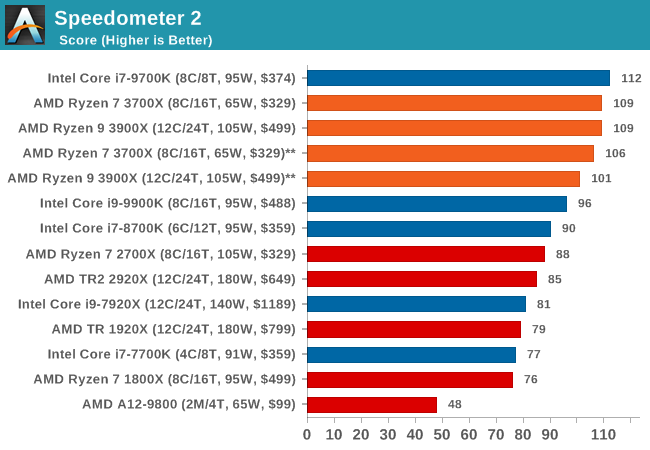
Google Octane 2.0: Core Web Compute
A popular web test for several years, but now no longer being updated, is Octane, developed by Google. Version 2.0 of the test performs the best part of two-dozen compute related tasks, such as regular expressions, cryptography, ray tracing, emulation, and Navier-Stokes physics calculations.
The test gives each sub-test a score and produces a geometric mean of the set as a final result. We run the full benchmark four times, and average the final results.
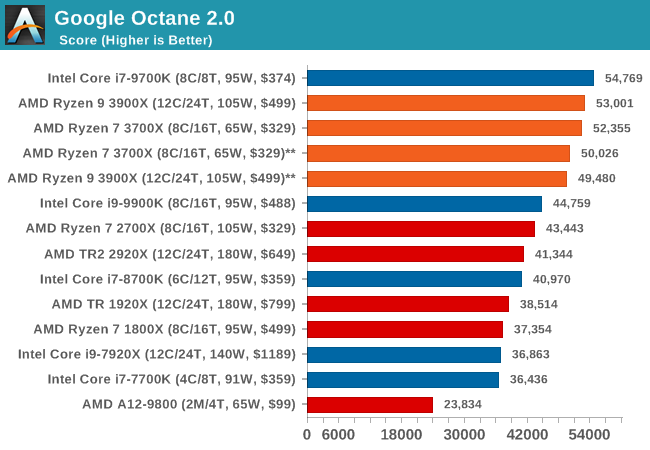
Mozilla Kraken 1.1: Core Web Compute
Even older than Octane is Kraken, this time developed by Mozilla. This is an older test that does similar computational mechanics, such as audio processing or image filtering. Kraken seems to produce a highly variable result depending on the browser version, as it is a test that is keenly optimized for.
The main benchmark runs through each of the sub-tests ten times and produces an average time to completion for each loop, given in milliseconds. We run the full benchmark four times and take an average of the time taken.
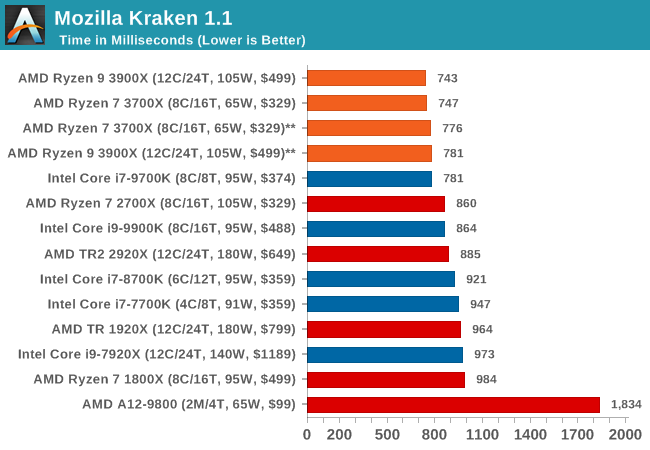
Web Tests Analysis
Overall, in the web tests, the new Ryzen 3900X and 3700X perform very well with both chips showcasing quite large improvements over the 2700X.
We’re seeing quite an interesting match-up against Intel’s 9700K here, which is leading all of the benchmarks. The reason for this is that SKU has SMT turned off. The singe-threaded performance advantage of this is that the CPU core no longer has to share the µOP cache structure between to different threads, and has the whole capacity dedicated to one thread. Web workloads in particular are amongst the most instruction pressure heavy workloads out there, and they benefit extremely from turning SMT off on modern cores.
Whilst we didn’t have the time yet to test the new 3900X and 3700X with SMT off, AMD’s core and op cache works the same in that it’s sharing the capacity amongst two threads, statically partitioning it. I’m pretty sure we’d see larger increases in the web benchmarks when turning off SMT as well, and we’ll be sure to revisit this particular point in the future.










447 Comments
View All Comments
Irata - Monday, July 8, 2019 - link
Thanks for your reply Ryan. I did not intend to be rude when saying "lazy" but rather show that I do not think this is something that was done by intent.Like I said - mention these things and it helps clear up misunderstandings.
It is definitely very positive that you test the Ryzen CPU with the latest builds though.
I also like that you mention if prices include an HSF or not, but it would have been nice to mention the price of HSF used for Intel systems (when not boxed), as e.g. the Thermalright True Copper is a rather expensive CPU cooler.
I think you already addressed not using a faster nVME drive (a PCIe 4 version would have been ideal if available - this would also have given an indication of potentially increased system power use for the Ryzen with PCIe 4 drives) on Twitter.
Those are little nitpicks, so not intended to be a criticism of the overall article. It is just that people tend to be rather sensitive when it comes to Intel vs. AMD CPU comparisons, given Intel's history of things they are willing to do to keep mind- and marketshare.
Daeros - Monday, July 15, 2019 - link
Whether or not it is intentional, AT has had an increasing Intel bias over the last several years. Watch to see how long it takes for an AMD article to get pushed down by rumors or vaporware from Intel or Nvidia.rarson - Monday, July 8, 2019 - link
I think Ryan brings up several salient points, and whether or not you think that they did or did not have the time to do what you wanted (they were also a man down without Dr. Cuttress), the fact of the matter is that AMD dropped a bunch of CPUs and GPUs all at once and literally everyone was scrambling to do what they could in order to cover these launches.I don't think it's coincidence that even in the tech Youtube space, if you watch 10 different reviews you'll largely see 10 different testing methodologies and 10 (somewhat) different results. Every single reviewer I've talked to said that this was one of, if not the most, difficult launch windows they've ever dealt with. Additionally, launching on a weekend with all of its associated complications (not just on reviewers' ends, but partners as well) is a bitch, with everyone scrambling at the last minute on their days off getting in last-minute updates and whatnot.
When AMD tells you at the last minute, "Oh, the brand new Windows 10 update includes something new" you don't necessarily have time to go back and redo all the benchmarks you had already done on the Intel platform.
TL;DR while there may have been flaws in some of the testing, take the details with a grain of salt and compare them to the myriad of other reviews out there for a better overall picture if necessary.
Irata - Tuesday, July 9, 2019 - link
You are making a good point and unfortunately this was an - unfortunately - typical AMD CPU launch with things still being beta. I would assume testers are none too happy about having to re-do their tests.What I don't get from AMD (even if (and that's a capital IF) it's not their fault, it's their responsibility) is how they cannot see how this makes their products appear in a less favorable light. Let's say the buggy bios cost them 5%, the conclusion with a 5% better performance would have been even more in Ryzen 3000's favor.
It's a bit like showing up to a job interview wearing the clothes you wore for the previous day's physical activity.
Daeros - Monday, July 15, 2019 - link
Lazy isn't in it. Intentionally misleading is more like it. On one page, where AMD wins more than it looses in the charts, out of 21 paragraphs, 2 had something positive to say about AMD or Ryzen 3k without following up with something along the lines of "but we know Intel's got new tech coming, too"Ryan Smith - Monday, July 8, 2019 - link
To be sure, they're still valid. The patches for Fallout and ZombieLoad are not out yet (I only mention them because the vulnerabilities have already been announced).RSAUser - Monday, July 8, 2019 - link
They've been out since 14 May, what are you talking about?djayjp - Monday, July 8, 2019 - link
Don't forget RIDLMeteor2 - Sunday, July 14, 2019 - link
RIDL and Zombieload are the same thing.Yes, the Intel CPUs should have been re-benchmarked on 1903, updated after 14 May when the OS-side fixes for the new MDS-class flaws were released. That's only fair and it's quite reasonable to expect that users will apply security updates, not leave their systems unpatched and vulnerable for perhaps a percent or two of performance.
FireSnake - Monday, July 8, 2019 - link
Ryan: how is this not explained in the article? I am reading this site for more then a decade and I trust you most. and I trust you will provide such information. I would expect, you update the article with this info.